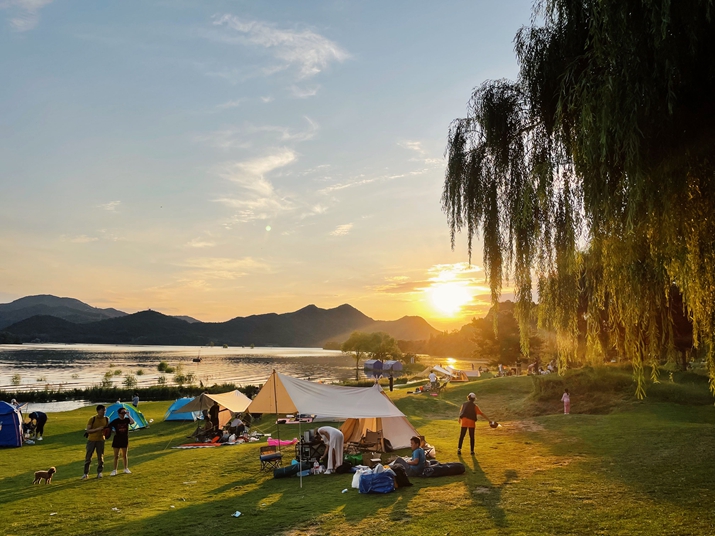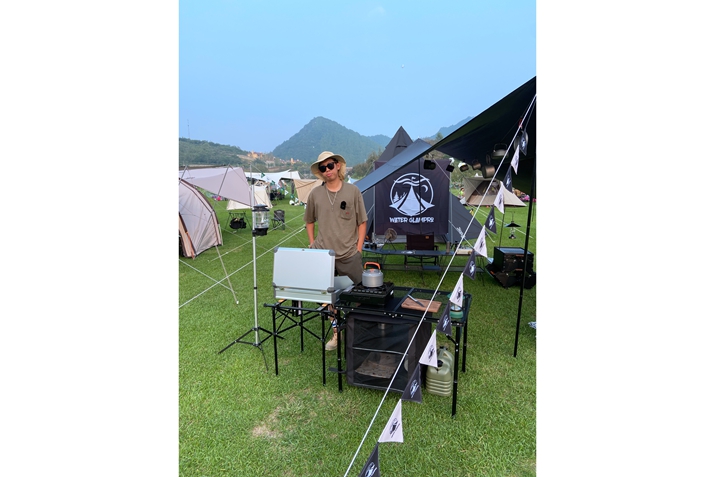| China |
| Glamorous camping has become the new outdoor trend in China since 2020 | |
|
|
 People camp out in Pinggu District of suburban Beijing on August 29 (TAO XING)
When he is not at work, he is busy with his camping business. Yu Sanshui, a 31-year-old digital product engineer in Beijing, spends over 70 percent of his spare time on camping-related activities. He rented a 12-square-meter warehouse space in northwestern suburban Beijing as his "base" and goes there almost every day. The engineer slash vlogger slash camper originally rented the space to store his extensive camping equipment, which simply cannot fit into his apartment. Since his first camping experience back in 2018, he has spent a total of roughly 150,000 yuan ($23,190) on gear. Every time he goes out camping, he picks up differently composed kits from his base. China has seen a boom in glamping, a portmanteau of "glamorous" and "camping," since last year and Yu wants to up his game in this industry. He set up his own camping brand, Water Glampro, and created an account on Douyin, a major short video platform in China, together with five other people. He goes to the base on weekdays after work to shoot videos evaluating camping gear. On the weekend, the team member spend their time visiting campsites around the capital to produce introduction videos. Today, their account has over 14,000 followers. The camping boom Trapped by the pandemic, many Chinese urbanites are turning to glamping as a new pastime. The year 2020 was considered by many to be the making of glamping in China. It is a sooner-or-later find for urban residents in pursuit of a quick retreat from the concrete and steel jungle, as Yu claimed, and the pandemic just offered a strong push and made the trend develop earlier. This outdoorsy engineer has been making weekend trips around Beijing's downtown since 2009. At the time, he didn't have a car of his own and used to rent one almost every weekend to indulge in his hobby. He had heard of camping years ago, but only gave it a first go in 2018, together with his wife, in Zhangjiakou, a city that is just a two-hour drive from Beijing. "Camping, in earlier years, was mostly for those exploring the rough outdoors, like people trekking through the desert," Yu told Beijing Review. "The equipment they use is more for surviving than for enjoyment. The image of camping thus was a pretty tough one, far removed from the daily lives of ordinary people." Urban explorers, in recent years, have turned their sights to camping as they grew tired of hotel-stay travel style. They started spending their money on quality facilities and shared their camping pictures on social media. The idyllic views of tents in a grassland or by a river soon attracted growing public interest in camping. Facilities that allow people to get close to nature while still able to enjoy the comforts of modern luxury have given wings to a novel camping style—glamping. Yu doesn't agree with the opinion that glamping is only a luxury pursuit for the middle-income group. "It is true that you'd better have a car for camping, but you don't have to own a car; you can rent one, like I did before," he said. "Renting a car for a weekend will cost you less than 500 yuan ($77.3) and the price for a whole set of basic camping gear is less than 3,000 yuan ($464.1). The threshold is not high at all." With flourishing glamping grounds where facilities are ready to use, people just need to purchase a ticket to get in and don't have to buy any further equipment. It is more for new campers who want to get some experience of spending time in the outdoors. As these glamping sites usually also feature guesthouses, it is also preferable for families with kids or seniors who don't want to spend their nights sleeping in tents, Yu introduced. Approximately, there are about 60 to 70 such glamping spots around Beijing, and in China by large, the number is over 1,000. "We expect to see much more such campsites pop up this year," Yu said.  Yu Sanshui enjoys glamping in a campground in suburban Beijing on September 19 (COURTESY PHOTO)
Social and active Zhang Zheming, a photographer who runs a photo studio in Beijing, got his first taste of camping in June 2019 at a campground in suburban Beijing. It is a very spacious site and campers need to bring their own kits. "My son was almost 4 years old by then and ready for more outdoor activities," Zhang said. "The poster of that campground really caught our eye—the kids running around happily in a meadow as the adults are chatting and drinking casually in the tents. As they didn't have any experience in picking the right equipment, they didn't prepare the canopy, a camping must to shield oneself from strong sunlight. But this didn't affect their first experience. "My wife and I are more like homebirds. In the past, we only chose to stay at hotels or guesthouses while traveling," he said. "We are very happy to have discovered glamping and it is also a new way of socializing. My son used to be a shy boy, but now he is more outgoing and active." Zhang is also surprised to see how popular glamping has become over the past two years. The first time he went there in 2019, only 500 people joined in. But when he went there for the second time in 2020, he saw over 5,000 people. The growing glamping trend has also been reflected on Xiaohongshu, a popular lifestyle social media platform. Statistics from the platform show that in 2020, the time of users searching for the word "camping" was double that of the previous year. By June this year, there had been over 200,000 posts on the platform related to camping and glamping; by September, this number had jumped to 460,000. Huo Tian, a visual designer with Tencent in Hangzhou, capital city of Zhejiang Province in east China, is a camping novice. Before the pandemic, he regularly traveled overseas. After taking a break outside of Hangzhou in October last year, he became very active on the platform, sharing glamping pictures and collecting over 7,000 followers. Today, there are about 800 contacts in Huo's glamping-dedicated groups on WeChat, China's prevailing multipurpose social media platform. He regularly organizes activities through the groups and his influence has also attracted a few domestic brands in the field of camping equipment to contact him for further collaboration. "Even when the pandemic grinds to a halt, glamping will still be on my travel agenda," Huo said. Yu is optimistic about the future of camping. "When the epidemic is over, the camping boom might cool off a little," Yu said. "But camping will definitely become an added item on the to-do list for many Chinese in the future." He expects to see more followers on his Douyin account, maybe even 1 million. "I hope that through my efforts, more people can learn about camping and enjoy the pleasures outdoor life has to offer." (Print Edition Title: Glamping It Up) Copyedited by Elsbeth van Paridon Comments to yuanyuan@bjreview.com |
|
||||||||||||||||||||||||||||||
|